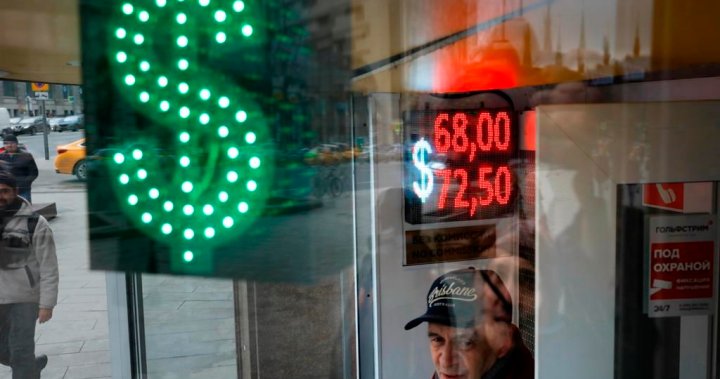
Russia’s move to pay for bonds in rubles may cause default
Global News
The U.S. has been attempting to force Russia to use its foreign currency reserves – or any revenue from oil and gas sales – in order to deplete the country's financial resources.
Russia said Wednesday that it made a debt payment in rubles this week, a move that may not be accepted by Russia’s foreign debtholders and could put the country on a path to an historic default.
The Ministry of Finance said in a statement that it tried to make a $649 million payment toward two bonds to an unnamed U.S. bank – previously reported as JPMorgan Chase – but that payment was not accepted because new U.S. sanctions prohibit Russia from using U.S. banks to pay its debts.
Russia said it has instead transferred the funds in rubles into a special bank account with Russia’s National Settlement Depository, the country’s securities regulator. The ministry added that once the country is allowed to access foreign exchange markets _ not something that will happen for the foreseeable future due to sanctions _ it will decide whether to allow bondholders to convert the ruble payment back into dollars or euros.
While Russia has 30 days of leeway to catch up with its payments, investors have been betting on a default. The contracts governing Russia’s bonds require in most cases payment in euros or dollars with few and narrow exceptions known as an alternative payments clause. Russia contends that it has met those exceptions but sovereign debt experts have argued otherwise.
“It is not clear to me, even if the clause is there, that Russia would be entitled to use it,” said G. Mitu Gulati, a professor at the University of Virginia School of Law and an expert on sovereign debt restructurings and contracts, in an email. “That’s a debatable question. I’d argue that they are not. But this would be a question for a court.”
Ratings agencies have downgraded Russia’s debt to “junk” status and said a default is highly likely.
While Russia has signaled it remains willing to pay its debts, the Kremlin warned that if sanctions stayed in place, it would continue to pay debtholders in rubles instead of dollars or euros.
“Russia has all the resources needed to service its debts,” said Dmitry Peskov, a Kremlin spokesman. “If this blocking continues and transfers for debt repayments are also blocked from these frozen funds, they can be paid out in rubles.”











